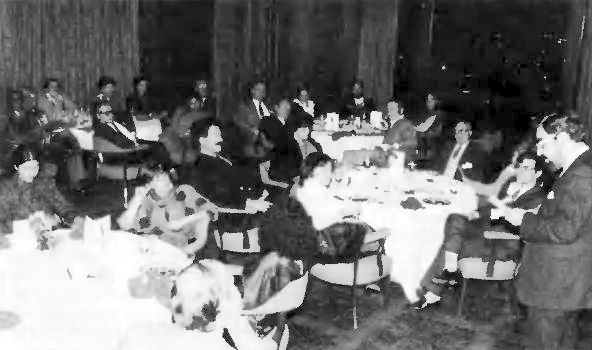![]()
The Words of the Reinig Family
|
|
The Words of the Reinig Family |

At
the final banquet, Dr. Evanghelos Moutsopoulos from Greece recites a
French poem.
From January 31 to February 4, 1986, the Professors World Peace Academy of Turkey sponsored a seminar in Istanbul entitled, "Education for the 21st Century: The Way to a Better Future in the Middle East" Thirty professors and scholars from 12 countries of the Middle East attended.
Over the three full days of the seminar, the participants discussed various issues relating to education such as social evolution, financing higher education, conflict regulation, computer and satellite utilization, the impact of Westernization, and women in education.
The conference was blessed with a number of outstanding scholars. The chairman, Dr. Adnan Badran, is the president of Yarmouk University in Jordan, a brother of the former prime minister, and probably the most famous university president in the Arab world, because he has taken Yarmouk from a small collection of huts to a major university in a very short time. It is expected that Dr. Badran will be the editor of a book that will be published from this conference.
The prime minister of Turkey, Turgut Ozal, although he could not attend the seminar, has expressed great interest in the work of PWPA and is contributing a belated keynote address for the book.
One of the participants, Thomas Cromwell, filed a report on the conference. The following are some excerpts from that report:
The conference in Istanbul went very well. The program was intense, but the discussions were frank and fruitful. There was a wonderful mix of nationalities represented. I have noticed that the tension that exists between the Arabs and Israelis in particular gets less year by year. Each meeting sees traditional differences dissolve as the process of sincere interaction and dialogue takes its effect.
This time, one of the most interesting of these developments was in the relationship between a Palestinian and a Maronite Christian. Both are young and aggressive, and from the outset they clashed. But the final evening they performed a couple of Arabic songs together for the rest of the group!
Another one of the participants, a Christian from Mosul, Iraq, who has spent a lot of time in the United States, came to the meeting with many misgivings about our sponsorship. By the end of the seminar he told a few participants he was chatting with that he could see the Unification movement as perhaps the only hope for the world.
In addition to the sessions, we took one afternoon for a luncheon and tour of major sights, shopping, and finally dinner at a restaurant outside the city. On the way home the participants, inspired by Dr. Abdulaziz Saqqaf, sang to entertain one another.
Through these conferences a core of committed people who are willing to put in real effort to see PWPA achieve success in the Middle East is steadily growing. Incredibly, PWPA is attracting some of the region's best minds.
I feel there is a deep longing for peace and reconciliation in this area, at least among concerned people. PWPA is finally providing the opportunity for these people to express their good will.
One of the participants proposed a dialogue among Lebanese factions to examine how to build a new Lebanon for the future. One Maronite Christian told me that they would only get involved in such a dialogue if PWPA were involved. The sad thing about this is that the bitterness and resentment is so deep among the factions and sects of the region that even well-intentioned plans cannot be realized: the fear of hidden agendas is too great. PWPA is showing that its concern for all the peoples of this area is completely sincere, realizing our own principle that God is the Parent embracing all humankind. I mention this because I feel it is a very important and substantial vindication of True Father's teaching and vision.
In addition to the Lebanese dialogue, PWPA can also play the mediating role with the Greeks and the Turks, and the Arabs and the Israelis -- making not just symbolic gestures but real programs to create a climate conducive to peace.
Greece and Turkey are two important members of NATO, forming a crucial part of the southern flank of the alliance. Yet despite their importance to the free world, these two neighbors are always at each other's throats. Because they cannot resolve their differences through peaceful dialogue, tension remains high in the east Mediterranean, and longstanding problems, such as the Cyprus issue and the dispute over rights in the Aegean, remain unsolved.
On visiting the Hagia Sofia in Istanbul during our seminar, the sadness of the Greeks at the poor condition of the most sacred of all Orthodox monuments was palpable. At the same time, the poor state of repair of Muslim religious buildings in Greece, especially mosques in Thrace, came to mind. Every Greek would like to contribute to the preservation of Hagia Sofia, and Turks to the care of the sites that concern them in Greece. But this cannot be achieved directly, for political reasons.
I feel strongly that PWPA can help reduce this tension and create an atmosphere conducive to the peaceful resolution of conflict between these neighbors by encouraging cooperation between them in non-political areas, such as the preservation of these historic religious buildings.
Each of the meetings that PWPA holds in this region seems to stir the fires of inspiration and leads to a number of new proposals. I don't think there will be a shortage of new ideas for a very long time to come.